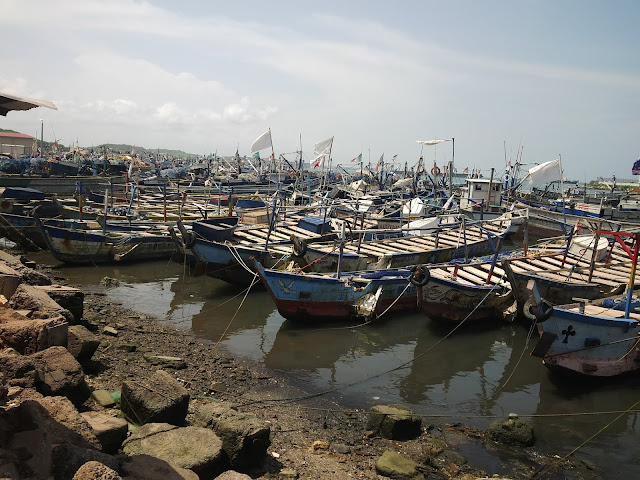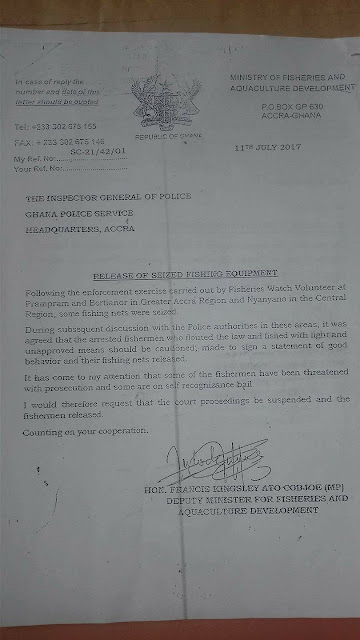Overcapacity in Ghana's canoe sector: Fact or Myth?
 |
| Canoes at Tema New Town waiting to set sail |
My commitment is to equity and sustainable fisheries resource management in Ghana's fisheries. I have worked with a few organisations to support the effort of the Fisheries Commission, Ghana in managing small scale fisheries. The argument has always been, among other things, about overcapacity in the canoe sector and the need to reduce the canoe fleet size (fisheries management plan, 2015 - 2019). On the surface and probably back by some statistics this may appear true but I beg to differ!
Small scale sector and overfishing challenges
There are currently over 13000 canoes in Ghana operating from over 300 landing beaches along the 550km stretch of Ghana's coast. Fisheries Commission has field stations in all four coastal regions where landing data is collected and sent to the Fisheries Statistical Survey Division of the Commission for analysis. It is from here that we get our national landing data that is used for the management of the resource including the provision of subsidies (premix, net, outboard engines, aluminium basins and more) to fishermen in the small scale sector. The small scale fisheries sector target mainly small pelagics and some demersal species (only a few go after large pelagics such as tuna, marlin etc). they have an exclusive space to fish, that is, the Inshore Exclusion Zone (IEZ) where industrial fishing vessels are not supposed to fish. Small scale fisheries in Ghana is said to support over 2 million direct and indirect job hence, absorbing a large part of Ghana's working population.
This significant contribution of the small scale sector is being undermined by increased industrial trawlers' incursion into the IEZ and also the deliberate targeting of small pelagic species reserved for this sector. In 2017, 100,000 metric tonnes of fish were landed illegally by the 76 registered industrial trawlers alone. Fish that could have been caught in the empty nets of small scale fishermen. This practice of landing and selling fish illegally at port and sea to unlicensed canoes, known locally as saiko, has been going on for over 10 years. over the last 10 years, Saiko has contributed to the decline of the small scale landing nationally but this has only been addressed as a problem of overcapacity in the small scale sector.
When 76 is more than 13,000
If indeed the small scale fisheries sector with over 13,000 canoes has a problem of severe overcapacity, how come 76 registered trawlers were able to land 100,000 metric tonnes of small pelagic in 2017; an estimate which is about three times higher than what the canoe lands nationally?
Is it that the problem is with the high and mighty trawl industry with about 90% of their ownership linked to opaque Chinese businesses? If that is the case, are our poor and vulnerable small scale fishers just a soft management target?
we need to begin to interrogate this and look at available and 'hidden' data to get the management right. The STWG report indicated an imminent collapse of the small pelagics (sardinella) if we continue with business as usual (see: collapse of the small sector fishing is imminent; small pelagic fish near total depletion; the state of artisanal fisheries: how much tine does Ghana have; closed season factsheet)?
Flattening the curve
We continue to direct management action at overcapacity in the canoe sector with limited outcome(s); I believe if we are to see the fisheries decline curve arrested, we will have to address the illegalities of the trawlers head-on. We cannot preach equity on one hand and deliver injustice on the other.
If the small pelagic is the preserve of the poor coastal dwellers, then the trawlers must be forced to stop the deliberate targeting of this resource; they must be stopped from stealing the people's fish and selling it back to them. They must begin to accurately report catch because misreporting leads to poor management decisions. The blunt enforcement approach has not yielded a desirable result because the pang of hunger is stronger than the fear of arrest. The identified management issues in the small scale sector are an adaptation mechanism by the resource users in this group to remain resilient in the face of the clear and present danger they face - the industrial trawlers
If the small pelagic is the preserve of the poor coastal dwellers, then the trawlers must be forced to stop the deliberate targeting of this resource; they must be stopped from stealing the people's fish and selling it back to them. They must begin to accurately report catch because misreporting leads to poor management decisions. The blunt enforcement approach has not yielded a desirable result because the pang of hunger is stronger than the fear of arrest. The identified management issues in the small scale sector are an adaptation mechanism by the resource users in this group to remain resilient in the face of the clear and present danger they face - the industrial trawlers
The article is solely my opinion based on over 10 years of observing the fishery space in Ghana



Comments
Post a Comment